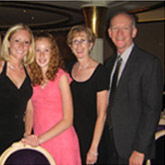In this era of "quiet quitting," where Gallup notes that some 50% of U.S. workers are "not going above and beyond at work," the work/meaning connection warrants a closer look.
Of course, a lack of passion at work is nothing new. In the opening scene from the 2002 movie About Schmidt, Warren Schmidt, played by Jack Nicholson, is staring at a clock on the wall of his office, counting down the minutes before his final day at work will be over and his retirement will begin. He has spent his career working as an actuary for an insurance company, where he rose to the position of assistant vice president through decades of steady work.
At a retirement dinner that evening, a long-time colleague toasts him, telling Schmidt he should feel "rich" to have devoted his life to something so meaningful. The look on Schmidt's face says he's not so sure. He once dreamed of having his own business but instead chose the security of a steady paycheck.
A universal longing
Shortly after Schmidt's retirement, his wife dies. The sudden changes — retirement, the loss of his wife of over 40 years — leave Schmidt wondering even more about the meaning of his life.
"I know we're all pretty small in the big scheme of things," he writes to Ndugu, a six-year-old Tanzanian orphan he sponsors in response to a television advertisement. "And I suppose the most you can hope for is to make some kind of difference, but what kind of difference have I made? What in the world is better because of me?"
Our culture would have us believe that life is about what we can get — bigger homes, nicer vacations. But as Nicholson's character expresses, it's contribution that we long for, a sense that we're making a difference with our lives.
The search for meaning
I used to think there were just two types of jobs in the world: inherently meaningful jobs and all the rest. Meaningful jobs were ones in which the work itself helped people or helped solve one of the world's great problems. Any other type of job was just a job. I now see it differently.
Some people do get the chance to do work that most would agree is inherently meaningful, such as sharing the Gospel, healing people, or eradicating diseases. However, there are many other types of jobs where great meaning can be found as well.
For some people, the satisfaction of providing for their family makes their work meaningful.
For others, their relationships with co-workers give their work meaning.
For others, their sense of meaning comes from how they use the fruits of their labor. For example, I know a corporate attorney who lives far beneath her means in order to contribute significant time and money to a ministry that keeps kids out of gangs and helps homeless people get a new start.
For some couples, their joint decision to have one parent stay home to focus on their children infuses the work that both of them do with meaning.
Maybe meaning is an inside job
When we struggle to find meaning in our work, one possible cause is that we think meaning is strictly something our work should bring to us instead of us bringing meaning to our work.
In his book Authentic Happiness, psychologist Martin Seligman tells a great story of a hospital orderly who meticulously selected pictures for the walls of a room where a close friend of Seligman's lay unconscious. The orderly explained, "I'm responsible for the health of all these patients. Take Mr. Miller here. He hasn't woken up since they brought him in, but when he does, I want to make sure he sees beautiful things right away."
This orderly viewed his work as integral to the healing of patients. Another orderly might think of his work as menial and meaningless. The first orderly sees his job as a calling; the second perhaps only as a source of income. The tasks are the same; only the perspective is different.
How do you view your work? Is the work you do inherently meaningful? Or, is your job a means to some other end that you find meaningful?









